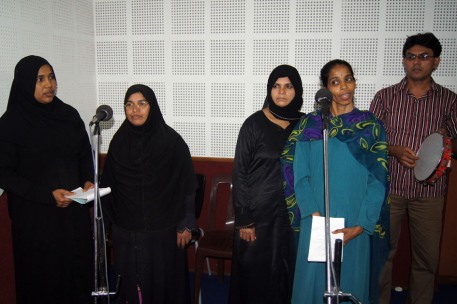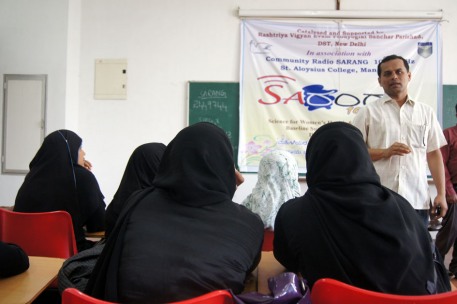
They say everything has a first time and every ‘first time’ is unforgettable. For Ms. Avamma of Ullal and her team, their first stint with radio has been more than memorable and how! These Beary women are on cloud 9 after their debut performance in a programme on HIV Aids for Community Radio SARANG 107.8FM of St Aloysius College, Mangalore, which won a National Award recently.
The programme won the Second Best Program Award for Promoting Local Culture, at First National Awards for Community Radios, in New Delhi on February 18. The awards were instituted by Ministry of Information & Broadcasting, Government of India, and it is the first time that the Ministry has instituted the awards to recognize and promote the best practices of Community Radios across the country.
The team of five Beary women consisted of Ullal’s Ms. Avamma, Ms. Khiarunnisa, Ms. Thousima, Ms. Bifathima and Harekala’s Ms. Zubaida. The team presented a chat show/skit called ‘Beary Harate’ wherein they played roles of local women who gather at a well to draw water and go about gossiping, ultimately discussing about HIV Aids. The programme was aimed at creating awareness on HIV Aids among the local masses, especially the Beary community.

The award, the ladies say, has brought them enormous satisfaction and recognition.
“I have been part of ‘Mahila Mandals’ in the past and am currently a member of the ‘Adarsha Foundation’ for women. I have been involved in various social service activities for quite some time but never got recognized. But ever since the news about our radio programme winning a national award spread, I have been getting phone calls from so many people”, an elated Ms. Khairunnisa says.
She is all praise for Richard Rego, the Director of Community Radio SARANG 107.8FM, for his support. “No one knew us. It is because of the platform that Dr. Rego gave us through Sarang, that we could get the recognition that we have got”, she says.
But what prompted these women to choose HIV Aids as their topic for their debut radio programme? “I have seen people around me fall prey to the disease and personally met four of them. There was this desire to do something about it and through this programme we could create awareness about the disease”, says Ms. Avamma.
Ms. Avamma is more than happy with the success of the programme, since she played the protagonist. “We were a bit scared initially and there was a sense of uncertainty within us, as to whether we will be able to do it or not. But thanks to the Radio Sarang team, who gave us training, we were able to prepare well and were up for the challenge,” she reveals.

Dr. Rego, the man behind Community Radio SARANG 107.8FM, has been striving to promote local culture and languages through the medium ever since its inception. That a Beary programme won an award has indeed brought him immense joy. The entire training process for Ms. Avamma and team, took place under his supervision. “The whole Radio Sarang team was involved whether it was me, the support staff, or the students. They (Ms. Avamma and others) were a bit scared initially like many others who come to us saying that they don’t know anything. We had to demystify radio to them and remove that notion from their minds that it is something too complex. We instilled confidence in them and got them in the radio mood by exposing them to some of our formerly broadcasted programmes in Tulu, Konkani, Kannada etc and told them that those were also made by ordinary people like them. They did respond and soon took up the mantle of presenting the programme with a sense of responsibility”, Dr. Rego discloses.
Buoyed by the success of the programme, Ms. Avamma is eager to come up with more. She already has a topic in mind. “I am very much concerned about young teen girls falling prey to adultery and prostitution. It is something that has been disturbing me for quite some time as many such cases are happening in our own localities. I want to create awareness among such young girls, giving them advice so that they don’t tread that path”, she reveals.
As someone who likes to sing, Ms. Avamma says, Radio has provided her an opportunity to showcase her singing skills. “I sing Beary songs and I used to get invitations for school functions and other functions for the purpose. Now Radio Sarang has provided me an opportunity to include my songs too as part of my programmes”, she says.
The team did use Beary folk songs in the award-winning programme. “We sung a Beary song in our programme on HIV Aids which had a message that Almighty God alone gives life and He alone takes it,” says Ms. Khairunnisa.

Community Radio SARANG 107.8FM, was launched in 2009 September by St Aloysius College, as its social outreach activity. It started broadcasting two hours a day, and gradually increased its broadcast. Currently SARANG 107.8FM broadcasts 24 hours a day, and is India’s only 24-hour Community Radio.
Roshan Crasta, Chief Programme Producer at Sarang, was also one of those who were involved in training the ladies for the programme. “Ms. Avamma and her team were quite comfortable with the programming towards the end and did a good job. Women have ideas and they can change a society. These ladies did tell us that their husbands encouraged their effort, which I think is such an important thing”, he reveals.
With a national award associated with their name and a desire to come up with more radio programmes, these Beary women are ‘on air’ for sure.

Photo courtesy: Community Radio SARANG 107.8 FM






Comments
Add new comment